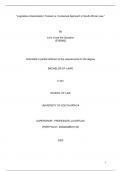Exam (elaborations)
RRLLB81 ASSIGNMENT 02 2023 SEMESTER 02 100 %PASS
- Course
- RRLLB81 (RRLLB81)
- Institution
- University Of South Africa (Unisa)
IS TEXTUAL INTERPRETATION OF STATUTE MORE USEFUL THAN CONTEXTUAL INTERPRETATION? Background Parliament as organ of the state has authority to pass laws. The laws are debated and formulated under the auspices of Parliament. Since Parliament is the drafter of legislation, one could assume tha...
[Show more]



